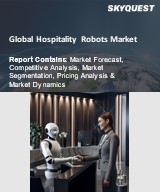
Report ID: SQMIG25S2055

Report ID:
SQMIG25S2055 |
Region:
Global |
Published Date: May, 2024
Pages:
221
|
Tables:
65 |
Figures:
71
Asia Pacific has been dominating the global hospitality robot's market. Countries like Japan and South Korea have been at the forefront of integrating robots into various aspects of hospitality, including hotels, restaurants, and customer service industries. Japan has been a leader in robotics technology, with companies like SoftBank Robotics and Toyota leading the way in developing and deploying robots for hospitality purposes. Additionally, China has also been rapidly adopting hospitality robots, especially in the context of hotels and restaurants, driven by a combination of technological advancement and a growing demand for automation in the service sector. However, it's important to note that the market dynamics can change over time due to various factors such as technological advancements, regulatory changes, and shifts in consumer preferences.
North America, particularly the United States, has been a significant player in the global hospitality robot market. While Asia Pacific has held the largest market share, North America has also been a prominent contributor to the industry's growth. The United States, in particular, has seen increasing adoption of robotics technology in the hospitality sector, including applications in hotels, restaurants, and customer service industries.
Several factors contribute to North America's presence in the hospitality robots' market, including a strong technological infrastructure, robust research and development initiatives, and a growing interest in automation and robotics across various industries. Additionally, North American companies have been actively involved in developing innovative robotics solutions tailored to the hospitality sector's needs.
Europe is also a significant player in the global hospitality robots' market, although it may not dominate the market share as much as Asia Pacific or North America. Several European countries, including Germany, the United Kingdom, France, and Italy, have been actively involved in the development and adoption of robotics technology in the hospitality sector.
In Europe, hospitality robots are used in various applications, including hotels, restaurants, airports, and healthcare facilities. These robots are employed for tasks such as room service delivery, cleaning, customer service, and entertainment, among others. Factors contributing to Europe's presence in the global hospitality robots market include a strong emphasis on technological innovation, robust research and development activities, and increasing investments in automation and robotics. Additionally, Europe's hospitality industry's growing interest in improving efficiency, enhancing customer experiences, and addressing labour shortages has driven the adoption of robotics solutions.
Our industry expert will work with you to provide you with customized data in a short amount of time.
REQUEST FREE CUSTOMIZATIONWant to customize this report? This report can be personalized according to your needs. Our analysts and industry experts will work directly with you to understand your requirements and provide you with customized data in a short amount of time. We offer $1000 worth of FREE customization at the time of purchase.

Report ID: SQMIG25S2055